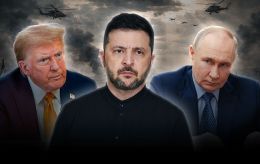Putin is furious. Kursk operation disrupts Russia's plans for ceasefire - Expert
 Photo: Vladimir Putin, Russian President (Getty Images)
Photo: Vladimir Putin, Russian President (Getty Images)
The operation by Ukrainian defenders in the Kursk region disrupted Russia's expectations of a potential ceasefire in the fall. As a result, Russian President Vladimir Putin resorted to terror, states Oleksandr Musiienko, Head of the Сenter of Military Law Researches, in a comment to RBC-Ukraine's YouTube channel.
The expert noted that recently, Russian forces have increasingly been using ballistic weapons, including inaccurate missiles provided by North Korea.
"Why are they launching these missiles? Because the Koreans might provide more, and if one hits a civilian area, perhaps Ukraine will agree to some unfavorable compromise peace terms. Putin said that 'bandits' need to be driven out of the Kursk region, and then maybe there will be negotiations," he emphasized.
Musiienko reminded that the commander of the Chechen special forces Akhmat, Apti Alaudinov, predicted in an interview with a Chinese journalist before the Kursk operation that "in another two months, the special military operation would end."
"They thought that they would reach a ceasefire sometime in the fall after battles in the east when they would be exhausted and come to some agreement, but Kursk broke all that. And the fact that Kursk broke everything is very infuriating and troubling to Putin," the expert noted.
Therefore, in Musiienko's view, Putin has renewed terror against the civilian population to force Ukraine to withdraw from the Kursk region and make concessions.
What preceded
Ukraine unexpectedly launched an operation in the Kursk region. From the start of the operation, the troops have continued their rapid advance daily.
The Ukrainian Armed Forces took control of the city of Sudzha and around 100 other settlements. Additionally, hundreds of Russian soldiers were captured.
According to Ukrainian President Volodymyr Zelenskyy, the plan is to maintain control over part of the Kursk region until Kremlin leader Vladimir Putin is compelled to enter negotiations.

